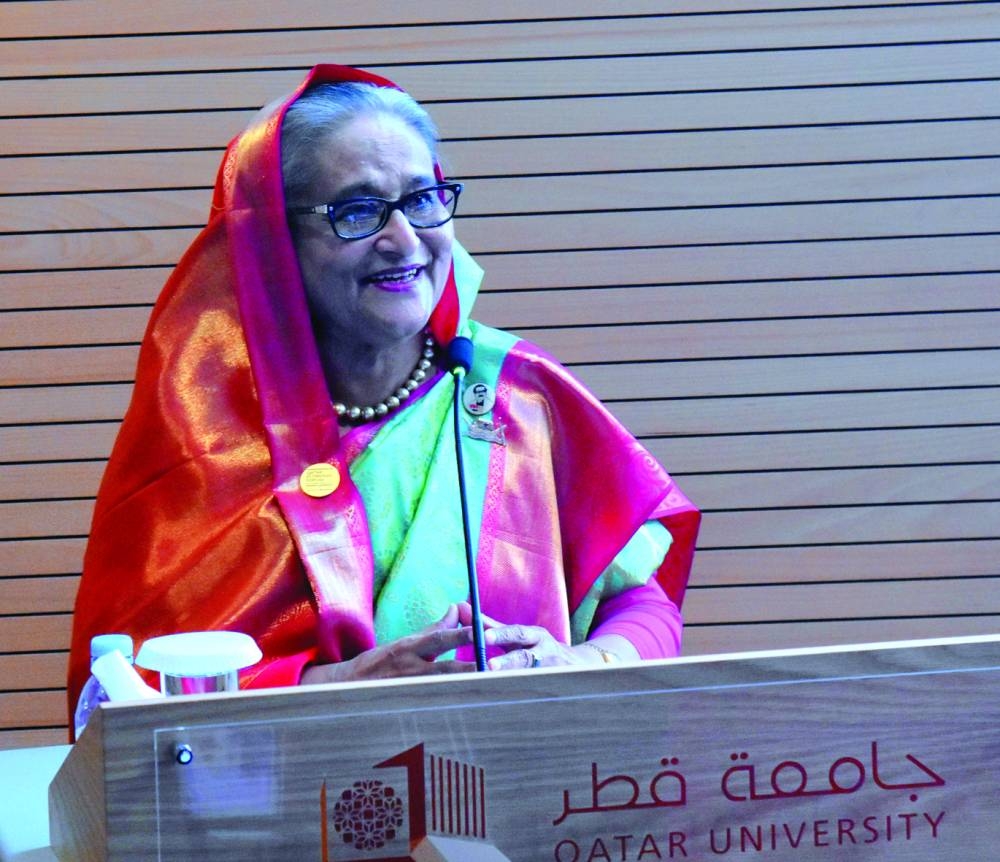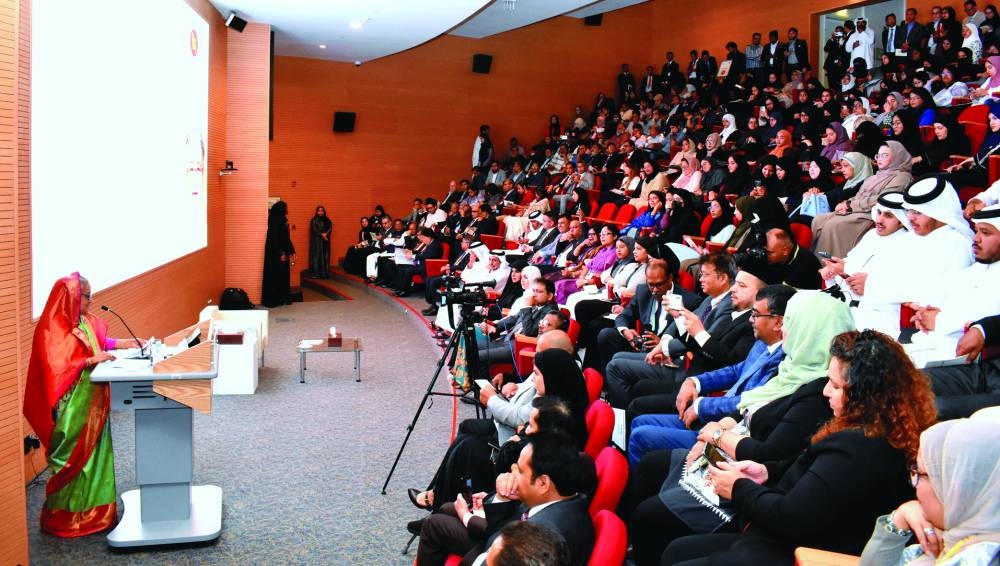Bangladesh Prime Minister Sheikh Hasina Tuesday said that her country has emerged as a model of women's empowerment, while also shedding light on the impressive socio-economic gains made by Bangladesh and the progress seen in education and creating a knowledge-based society.
She made the observations while addressing a seminar on ‘Women's empowerment and its role in building institutions in the community: Bangladesh as a model’ at Qatar University (QU).
Sheikh Hasina presented the seminar in front of a wide audience of senior QU officials, dignitaries, representatives from the embassy of Bangladesh and QU students. She said, “I am very pleased to be here with you all. I sincerely thank Qatar University for the warm welcome. I am delighted to be among the future generation’s leaders. I feel humbled to share the transformative development journey of my country, Bangladesh."
Sheikh Hasina noted that after years of efforts, Bangladesh now ranks the highest in South Asia in reducing gender disparity. "We have gender parity in favour of our girls in primary and secondary education," she said. "We are among the world’s top 10 nations for women’s political empowerment. Bangladesh is perhaps the only country where the prime minister, speaker of the parliament, leader of the opposition, and deputy leader of the House are all women.
"We have 33% seats reserved for our women in local government bodies. I made it a point to break all glass ceilings by placing our deserving women in top leadership positions everywhere."
"Bangladesh has the fourth largest Muslim population in the world, with over 91% Muslims. Our great Islam accords the highest respect to women and has many accounts of successful female leaders,” she pointed out.
Further, Sheikh Hasina said Bangladesh has made impressive gains in the areas of food security, free and affordable housing, community healthcare, compulsory primary education, women’s empowerment, financial inclusion, digital services, access to electricity, disaster preparedness and climate adaptation.
She called on young women and girls to have a greater involvement in the STEM (Science, Technology, Engineering, Mathematics) fields. "Our government is setting up a technical training institute for them. We are preparing rural young women to allow them to work as digital freelancers from home. We must work together to end all forms of discrimination against girls,” Sheikh Hasina said, noting that there are various programmes to train the young generation.
The Bangladesh primer minister said "today’s Bangladesh is a changed Bangladesh". "It’s dubbed as a role model for development. Hunger, poverty, malnutrition and illiteracy are vanishing fast. Our hard-earned development in the country is not a miracle. It is the collective work of our men and women. I have only tried to guide them in the desired direction," she said.
She explained that her government managed to build a solid foundation for Bangladesh’s socio-economic transformation during her first regime from 1996 to 2001. She went on to say that the Ashrayan scheme is implemented to provide free houses for homeless families. “We have established over 18,000 community clinics and rural healthcare centres through which primary healthcare services are being provided to the people.”
The initiatives include expansion of the social safety net to support the poor and marginalised sections of society and development in the education sector. She also noted that her government had taken a decision to give insulin free of charge from these centres. “All investment in the health sector has started to pay off.”
Addressing the students at QU, she said: “Dear students, without an educated population no nation can prosper. So, since assuming office, our utmost priority is education.”
“We want to build a knowledge-based Smart Bangladesh. In Smart Bangladesh, there will be a smart government, a smart economy, a smart population, a smart society and smart manpower. People will be made skilled in using digital devices so that they can contribute to the fourth industrial revolution,” she said. “The purpose of a Smart Bangladesh is to keep pace with a changing world and use digital devices in all areas of education, health, agriculture, industry, business and trade to achieve the goals. We are setting up digital labs in all educational institutions from primary to higher education levels.”
Making a slew of suggestions to realise the development goals, Prime Minister Sheikh Hasina asked students and youth to remain focused while representing values and keeping their spirits up,
“I would like to share a few suggestions for future leaders from my life’s experience and struggles — first of all, represent a value; remain focused on your vision; make concrete plans to realise your vision; lead by example and be the change-maker; trust your people and team; invoke your maternal spirit; and embrace the new and the future," she advised.
QU President Dr Hassan Rashid al-Derham honoured Sheikh Hasina at the event. Following the seminar, the floor was opened for a Q&A session, where Sheikh Hasina answered questions from the audience.

Bangladesh PM Sheikh Hasina addressing the seminar Tuesday.

A view of the audience.

Bangladesh PM Sheikh Hasina being honoured on the occasion.

